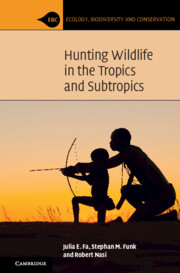Acknowledgements
This work is based on our many years of experience in the field working in a variety of human and natural environments and learning from these. Our work has been motivated also by our concern for the countless number of peoples we have met and worked with all over the world, Indigenous and rural, who are still trying to survive on a planet where resources are rapidly shrinking. We thank them all. We are also grateful to the many colleagues who have inspired us in our journey in understanding such a complicated and complex issue as wildlife exploitation. In particular, we need to mention our friends and colleagues John Robinson, Liz Bennett, David Wilkie, David Brown, Carlos Peres, E.J. Milner-Gulland, Guy Cowlishaw, Marcus Rowcliffe, Nathalie Van Vliet and Lauren Coad, for teaching us and challenging us. We would also like to thank our many colleagues from the Sustainable Wildlife Management Programme who are working on ‘Closing the Gap’ (Chapter 8) at project sites in Africa, Asia and the Pacific. Many collaborators across numerous organizations have motivated us and bettered our thinking over the years, we thank them all.
We are especially grateful to Michael Usher for his constant and wholehearted steer. Michael read and commented on all earlier drafts of the chapters. We also greatly appreciate the support and guidance of Dominic Lewis, Aleksandra Serocka, Jenny van der Meijden and Vicky Harley from CUP for smoothly enabling the process of turning manuscript into book. To Nikki Tagg, Sophie Von Dobschuetz, E.J. Milner-Gulland, Michael Alvard, Edmund Dounias, Daniel Ingram and Glyn Young we are thankful for taking the time to read all or separate chapters. Their insights, comments and positive criticism have improved the final manuscript incalculably. All views expressed in this book are entirely our own.
Finally, we would like to acknowledge the financial support from CGIAR Fund, USAID and European Commission. This book is part of the Bushmeat Research Initiative of the CGIAR research program on Forests, Trees and Agroforestry.

